Last week, a friend visited for tea. We talked about research into our respective historical homes. My husband and I have lived in the city of Cincinnati, specifically, Over-the-Rhine, long enough the details fizz out on what year we began our search, what year we found our 1875 home. The year we moved though, is etched into our minds. 2014. One daughter married. One graduated from college, the son from high school. Only the third child experienced no major life event that year.
The year was memorable for another reason. Friends, associates, mere strangers offered “advice” on living in the urban core—when they’d never stepped foot inside its true boundaries.
Other than where do you grocery shop (read that rant here), the top question asked about living in a neighborhood in flux, with its prosperous and dubious history, was, “You’re packin’ a gun, right?” More of a statement, it was accompanied by a shifty grin as if trying to sound like an actor in the movies, not real life.
Fast forward eleven years. Our living in Over-the-Rhine is still the subject of inquiry. The questions have altered slightly more in the form of do you still love living in the over-the-Rhine. Yet one question remains.
But do I love it? Yes. I love it for the walkability to three sports stadiums, countless concert venues from the largest Heritage Bank arena to the Woodward Theatre, a bevy of restaurants, art galleries, the opera, symphony and orchestra, art house theatres like Ensemble, Know, and Shakespeare, the museums, long walks up to Mt. Adams and across the river. Free events throughout the city and the parks in summertime and winter. Findlay Market, of course. And the ability to lose myself in the warped back alleys and in the fizz of city lights.
*
I grew up in Amherst, Ohio (population of 9,000 in 1970s, more recently, 12,500). Attending The University of Akron, I fell into its metropolitan rhythms given the school’s proximity to downtown. Akron was my chance to explore. My jogs extended for miles.
Everything was connected, everyone too; one could feel it by the buzz on the streets.
I moved to Cincinnati, or Hyde Park near, and lived in Oakley, both thriving city neighborhoods. Soon, my first husband and I departed for Loveland suburbs. Walks and jogs were curtailed. Plenty of square footage in our home, but not a lot of acreage for my feet on the streets to discover more about the people or places I encountered. Unless I jogged down country roads or drove to the long, flat, straight bike trail, at the mercy of cyclists speeding by. I spent too short a stint along the Oregon coast where one could hike for miles along the shore or in national forests. We returned to Ohio, and landed back in Loveland under challenging family circumstances.
Unaware, a sense of stuckness stuck with me for many years, despite the love I carried for my neighbors and friends.
In 2014, we arrived in Over-the-Rhine. Full of expectations, while at the same time trying to empty ourselves of them. My current daily average walk mileage is 4.5 miles, which covers all hours of the day, except 1 a.m. to 6 a.m. because my dad said, nothing good happens after midnight. That was the move prompted the questions about groceries and guns.
The are you packing a gun crowd has transitioned to the do you love it there, where should I eat? and where should I park for the FC matches? crowd. The inquisitions rarely stop.
What NO ONE ever asked, possibly fearing my answer—not for me, but how they might see themselves? No one ever inquired deeply, Why? Why do you love it there?
One day, I asked myself.
*
I recently read an article in The Atlantic about what was called Moving Day, how prevalent moving was for Americans in the early 1900s, before we settled on the American dream of home ownership, or the “dream” was settled for us by the same forces of capitalism witnessed today.
May 1 was a day when tenants moved. With a propensity to occupy all the spaces, people moved up to the next level of housing, due to accumulated wealth, larger families, larger extended families. Sometimes moving down due to loss of wealth or family.
People didn’t stay in one place very long. They moved. This might have brought about a certain physical or emotional hardship, it also created the opportunity for people to get to know mere strangers, people that were “not like us.”
The title of the article is How Progressives Froze the American Dream. In reading the piece, progressives, often equated to liberalism, here are more related to NIMBYism, not in my backyard. People concerned about property values and who lives next door to them. We see it now in the case of Cincinnati. Some who are fighting back against Connected Communities are concerned about property values (with “fear of renters moving in next to single-family home owners”) in the same neighborhoods I once lived in apartment buildings. My friends, young up and comers who went on to lead consumer products teams, IT sales, brand agencies, etc., lived in four-unit brownstones, like the kind those neighbors no longer want.
“Moving Day was nothing short of “a religious observance,” the humorist Mortimer Thomson wrote in 1857. “The individual who does not move on the first of May is looked upon … as a heretic and a dangerous man.”
What might have made someone so “dangerous?”
“The key to vibrant communities, it turns out, is the exercise of choice. Left to their own devices, most people will stick to ingrained habits, to familiar circles of friends, to accustomed places. When people move from one community to another, though, they leave behind their old job, connections, identity, and seek out new ones. They force themselves to go meet their neighbors, or to show up at a new church on Sunday, despite the awkwardness. American individualism didn’t mean that people were disconnected from one another; it meant that they constructed their own individual identity by actively choosing the communities to which they would belong.”
(*I must note how early African Americans were mobile or not, made so by lack of choice).
The entire paragraph struck me. “Leaving behind…seeking out new….they force themselves….despite the awkwardness.” The words referred back to my “why?” Why do I love it here?
*
Living here has challenged every preconceived notion I’ve held for the past 20–or 60–years. As a young northern Ohioan, I held rather conservative views, raised Catholic and duty bound to Friday night football. Those views dissipated when I chose not to ask my first husband to seek an annulment. I wanted to marry a man who understood loss in a way other men his age did not. The viewpoints were further eroded by the tides when I moved to Oregon on the coast. Young and pregnant, husband traveling every week, I would have to rely on the kindness of fisherman, retired school teachers, lumberjacks, and every other stereotype of Oregonians you can imagine. In essence, I had to release more of my preconceived notions into the proverbial sea.
Fast forward to 1998, a move back to Loveland, more liberal now than perhaps in the past, but not entirely so. My neighbors saved me more than once. But most people scurried inside their homes. Houses closed up at night, while my son Davis and I took our nighttime walks with his Bug’s Life headlamp, or Mark and I went on our night-time passeggiattas after travels to Italy. We had nowhere to go, other than the circular concrete islands where we lived. It was all too easy to live inside ourselves.
In yoga, there’s a saying, “shift shapes to shift states.” Maybe not a literal state as part of the U.S. My mind really needed a stretch off the kind of couch that kept me from getting into a shape a desired. I needed a shift.
The move to the city was a surprise for our kids and families. Within the circles of more liberal friends, one told me they didn’t think I was cut out for it. Proof anyone can be a victim of preconceptions, held captive by rules to be broken from time to time.
The Atlantic is on to something. So am I. Long ago, a deacon counseled me about visits to nursing homes. Outsiders are good because family always talks about the same things.
I recall how my aging mother wanted to move from the family home, asking my father to find a smaller home. He eventually considered it, but a different move was then required in her cognitive decline. Can we be crushed by the weight of too many memories or belongings to hold (a rationale for Moving Day)? By hoarding, such as the main character in the Ensemble Theatre’s play, I Need That, who never ventured outside his door after his wife’s death? His belongings piled up, he was unable to release them. Nor release himself into the outside world. As one might say, he was buried by his past.
Some of us can be buried in the present and not know it, buried by a stuckness. An inability for mobility.
How much longer will we live in this house? Another question asked by some.
I like here. Every day, my mind grows, challenged to rethink situations about who is unhoused—and why? Children, the age my son was when I was single mom in Loveland walking him to the driveway’s end for the bus, these children wait on dark streets for a metro bus in the same neighborhoods most won’t walk in—why? There’s a proliferation of non-profits that exists within the city limits and not the suburbs—why? The preservation of old buildings, ones that makeup our character, ones that drag development down, is often debated—why?
The bridge builders who plowed through sub-zero weather to fix a main bridge across the Ohio, while I had the luxury of walking with two thermal layers beneath my coat. Do they love that work? Why? Sewer diggers doing the same below ground in the frigid air. The garbage people who show up long before most people wake, the postman who reads what’s in my poetry mailbox. Why? The immigrants who came here—and why? Who came in their place—and why? The subject matters broaden; those given the gift of longevity who can’t acknowledge what we need to save for younger generations—why? Bullies appear daily in the news, more than I’ve ever witnessed on the streets of Over-the-Rhine. They are revered—why? People cheer when thousands of federal workers are impacted by job cuts—as long as it doesn’t constrain those cheerleaders personally. We’ve achieved a new level of NIMBYism, whether or not something impacts their backyard, they’re near giddy that it will impact yours. Why?
In the ten, twelve years that have passed since our “moving day,” I’m still irked by some of the queries posed to us. I’ve never forgotten the faces of folks who asked, are you packin’, while I sported a wry grin—and answered with a question of my own.
“Why?”
In other news…
TODAY: Feb 18 - I will be introducing and leading a Q&A for As If You Will Remember, “an interdisciplinary artistic response to dementia’s multi-faceted and increasingly prevalent sorrows,” developed in part by my colleague, Pauletta Hansel. Fundraiser for Giving Voice Foundation. Information below.
Feb 25 - Caring for the Caregiver writing experience with Pauletta Hansel and Annette Januzzi Wick. Giving Voice Foundation. Virtual. Free. Continues with three other sessions. Sign up here. 10 - noon.
March 12 – Lloyd Library. The Impact of Plants & Nature-Based Supplements on Breast Cancer Treatment. My husband and I are pleased to support the Lloyd Library as they present this program on breast cancer in conjunction with two renowned physicians, Jen Manders, breast cancer surgeon, and Julie Specht, a breast cancer oncologist, from The Christ Hospital. Visit here to register.
April 1 – National Italian American Foundation, Ambassador magazine: NIAF on Location: Cincinnati. Visit: https://www.niaf.org/. Details coming soon.
April 1 – Edible Ohio Valley newsstands – The Charms of Cornmeal, Profile: Reka Butchery and Delicatessen. www.edibleohiovalley.com. Link coming soon. My latest online work here.
April 16 – Caring for the Caregiver writing experience, Alois Alzheimer Center. 1 – 3 p.m. Email: amjwick@gmail.com for details.
April 19 – Contemporary Arts Center Creative Writing Project. Runs 8 weeks. Sign up now!
May 10 – Climate Writing Workshop. My colleague Elaine Olund leads this climate writing workshop as part of Studio Kroner - All Else Pales - 2.
May 13 – Caring for the Caregiver writing experience. Giving Voice Foundation with Pauletta Hansel and Annette Januzzi Wick. In-person. Free. Continues with three other sessions. Sign up here.
August 12 – Caring for the Caregiver writing experience. Giving Voice Foundation with Pauletta Hansel and Annette Januzzi Wick. Virtual. Free. Continues with three other sessions. Sign up here.
November 14 – Caring for the Caregiver writing experience. Giving Voice Foundation with Pauletta Hansel and Annette Januzzi Wick. In-person. Free. Continues with three other sessions. Sign up here.

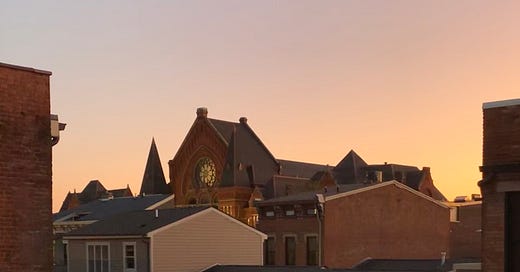


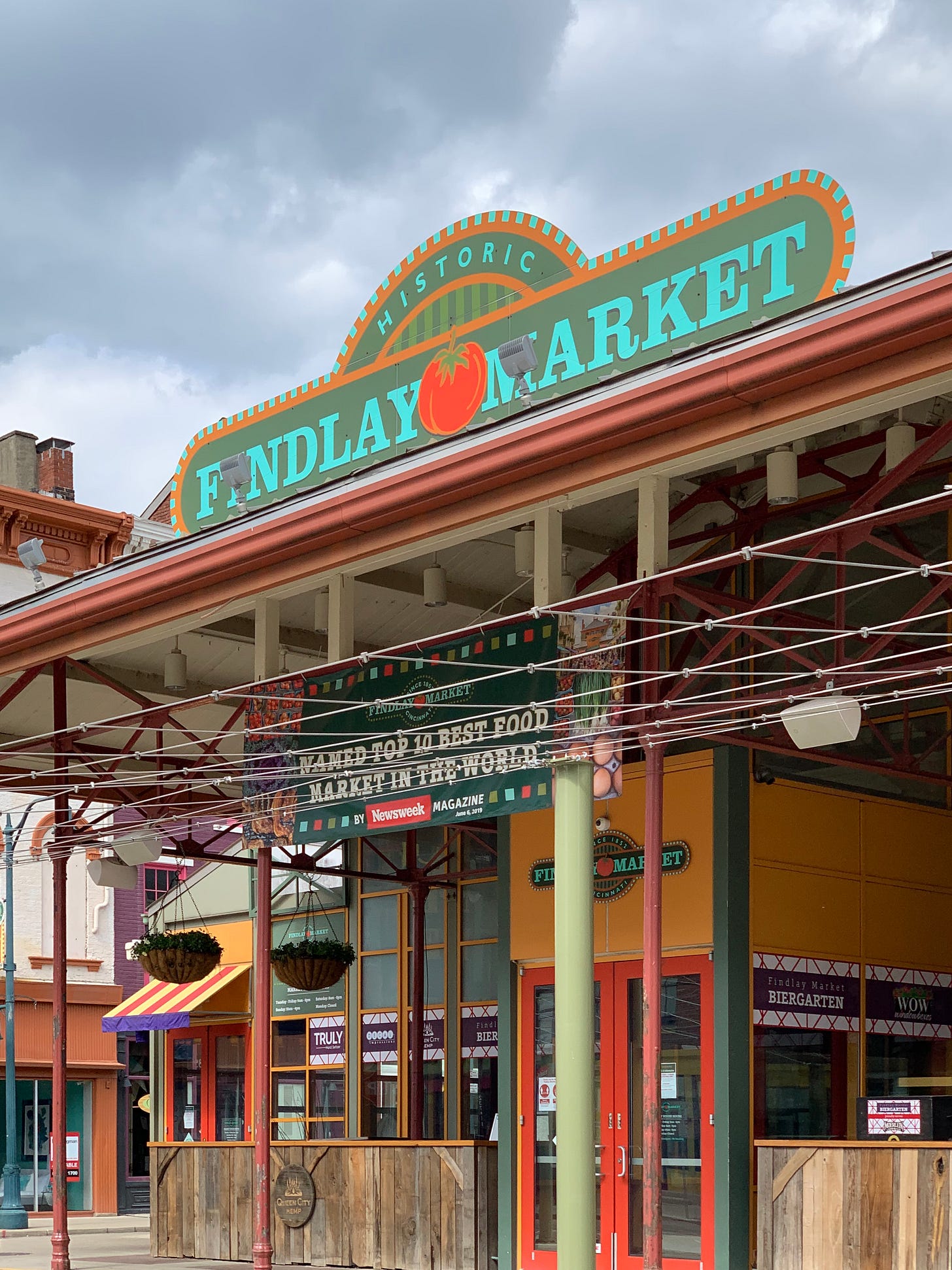

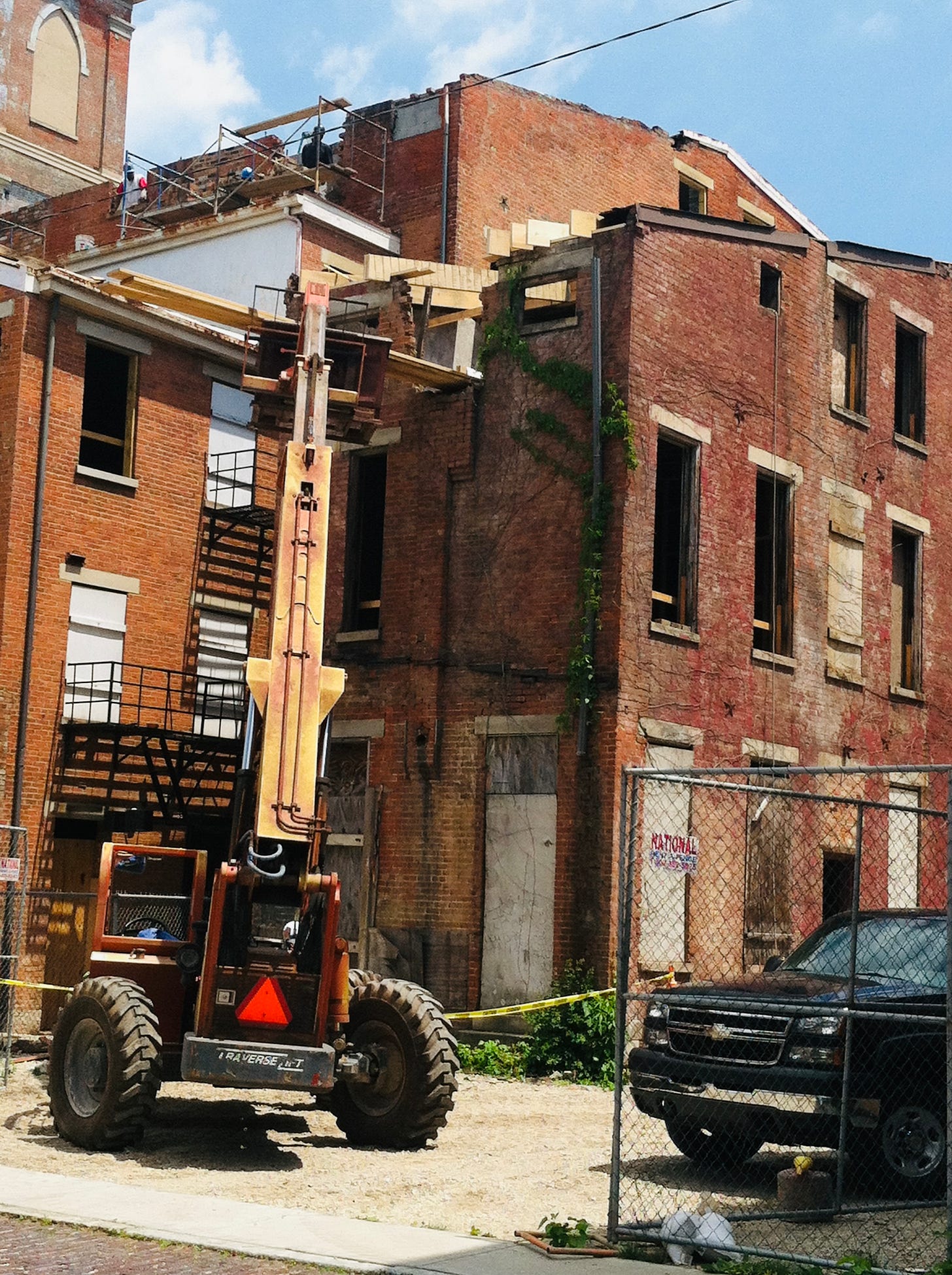
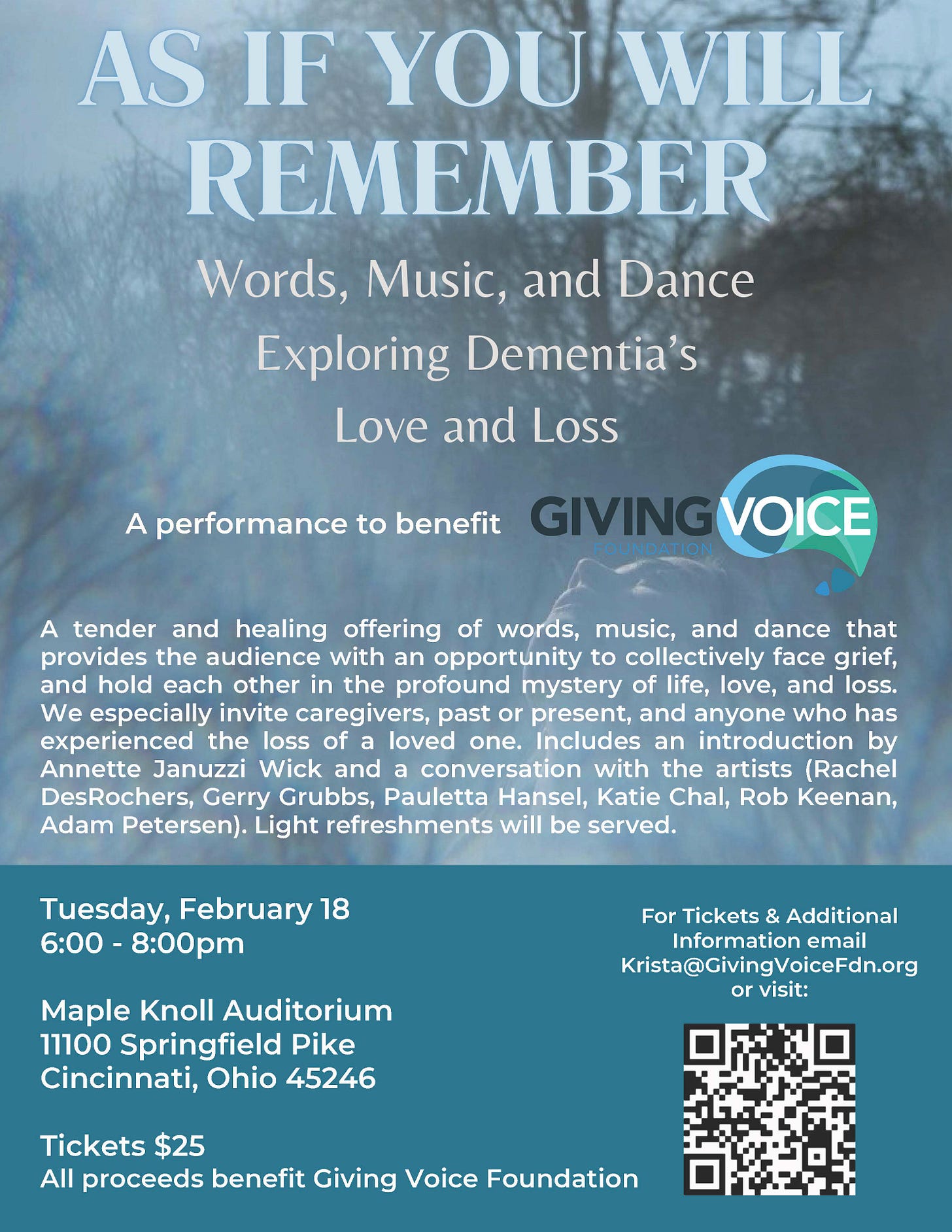
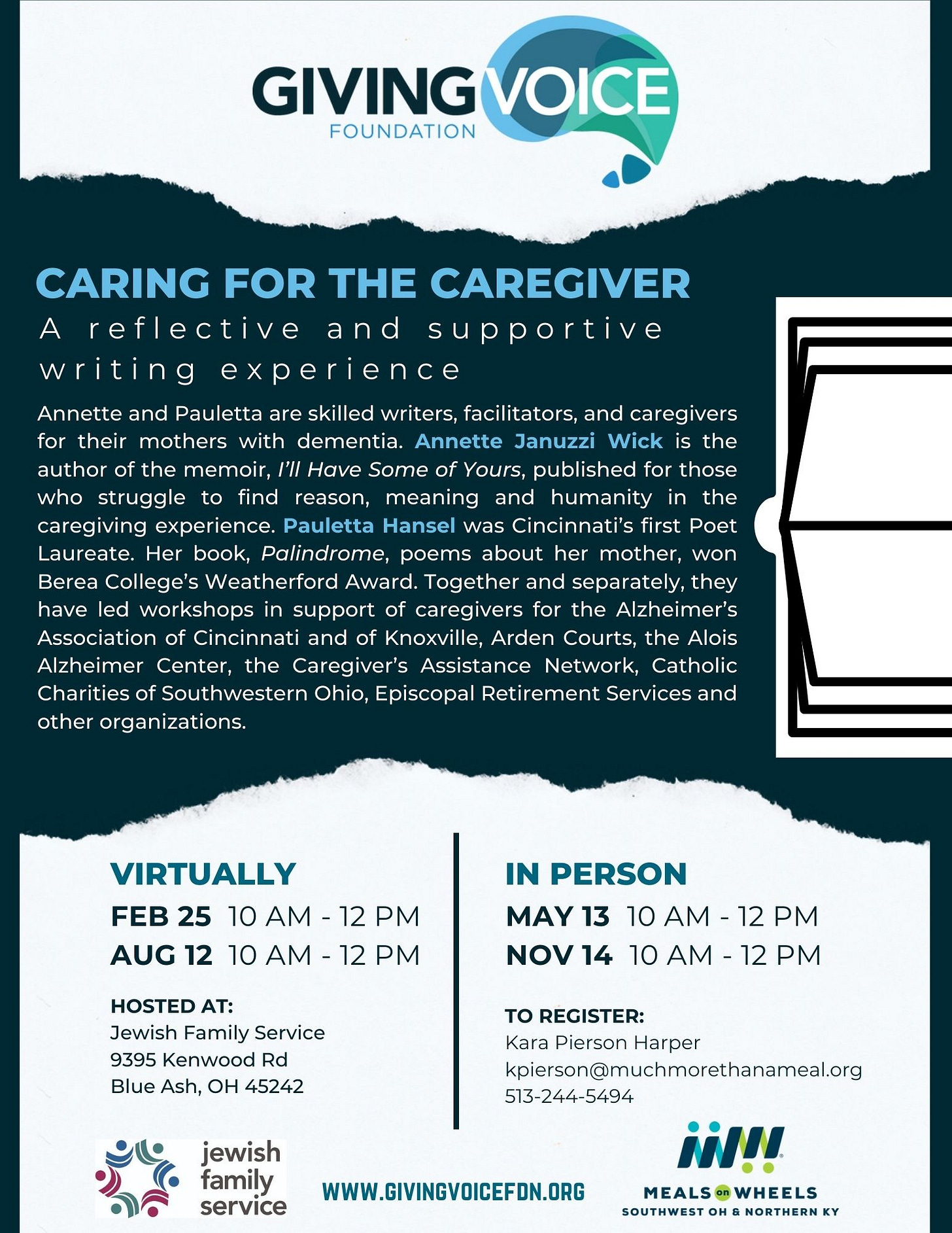
Love this piece! I miss city living. I had completely forgotten about moving day though. When I moved to downtown Chicago, there were no condos yet. So May 1 was when everyone either renewed or moved. I never viewed my one bedroom apt as too small because I had the whole city (same with living in Manhattan)! A lot of people that are scared of city living have never even been to a big city. They really don't know what they're missing. Thanks
I appreciated reading this article, and I'm glad you love Over-the-Rhine.